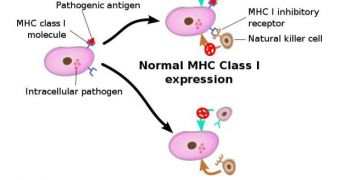For the first time ever, scientists at the Imperial College London (ICL) identified the gene that controlled the expression of NK (natural killer) cells, which are an important part of the human immune system. The gene's action in fact triggers the differentiation of blood stem cells into NK cells, which makes it one of the most promising options in devising new treatments for diseases such as cancer. This type of cells is at the front lines of fighting tumors, and experts are currently trying to find ways of harnessing the gene's powers for boosting NK-cell production.
Dubbed E4bp4, the gene that was identified as the trigger behind NK-cell formation was completely knocked out in lab mice. This led to the creation of the first animals ever recorded that had all the immune-system features one would expect from it, except, of course, the natural killers. The research is published in the September 13th issue of the respected scientific journal Nature Immunology, e! Science News reports. This line of research is also expected to provide experts with more clues on autoimmune diseases, the paper reveals.
Afflictions such as diabetes and multiple sclerosis are caused by dysfunctions in the immune system, which begins to attack organs inside the body, as if they were intruders. Identifying which of the cells is responsible for these attacks, and what role each kind of cell plays in generating the overall damage has been a long-standing objective in medicine. The new study may pave the way to a deeper understanding of these phenomena. Experts from the University College London (UCL) and the Medical Research Council's National Institute for Medical Research also contributed to the study.
“If increased numbers of the patient's own blood stem cells could be coerced into differentiating into NK cells, via drug treatment, we would be able to bolster the body's cancer-fighting force, without having to deal with the problems of donor incompatibility,” UCL Department of Life Sciences expert Dr. Hugh Brady, the leader of the research, explains the possibilities related to the new investigation.
“Since shortly after they were discovered in the 1970s some scientists have suspected that the vital disease-fighting NK cells could themselves be behind a number of serious medical conditions, when they malfunction. Now finally, with our discovery of the NK cell master gene and subsequent creation of our mouse model, we will be able to find out if the progression of these diseases is impeded or aided by the removal of NK cells from the equation. This will solve the often-debated question of whether NK cells are always the 'good guys,' or if in certain circumstances they cause more harm than good,” he concludes.

 14 DAY TRIAL //
14 DAY TRIAL //